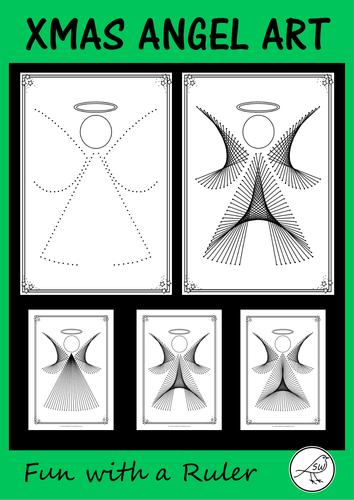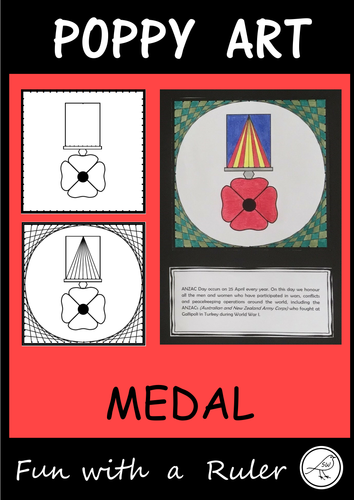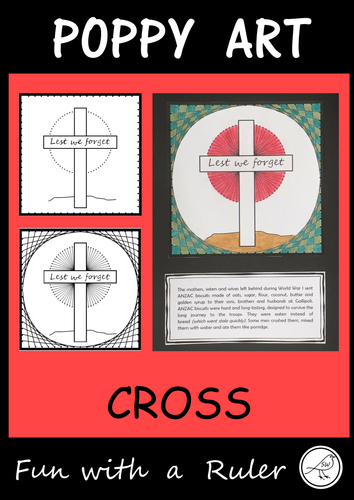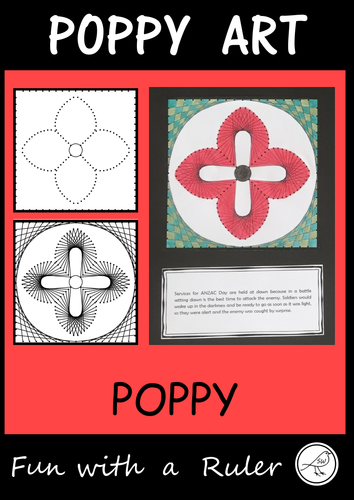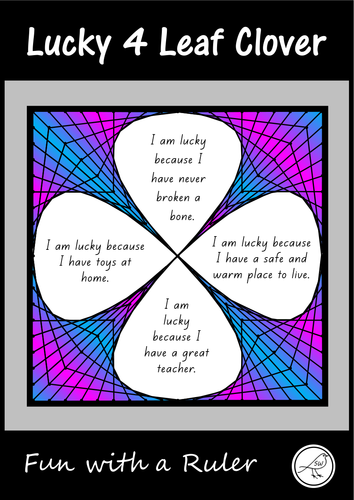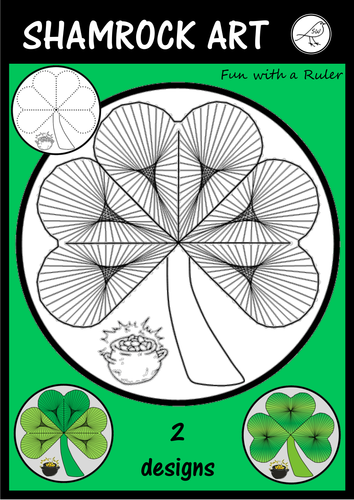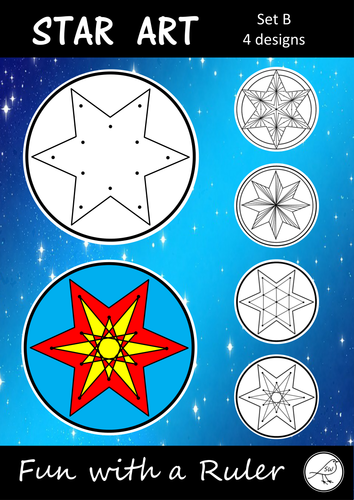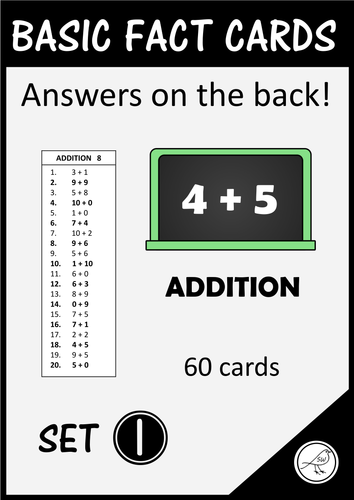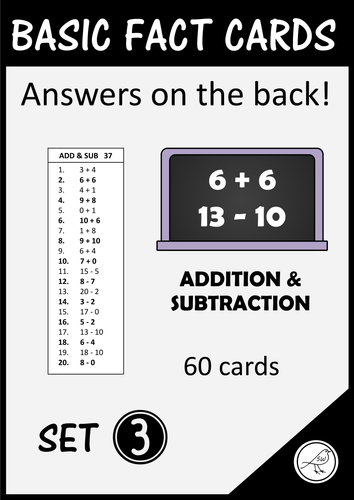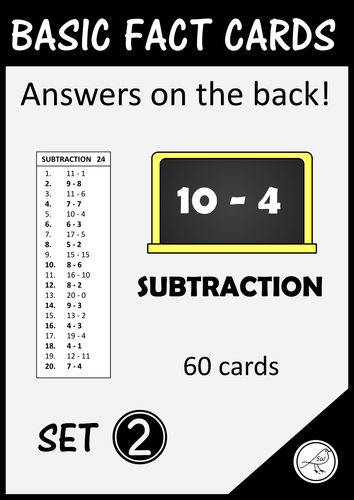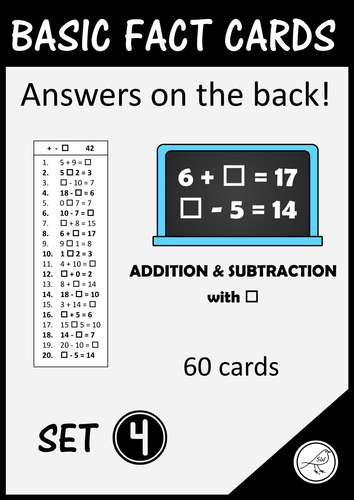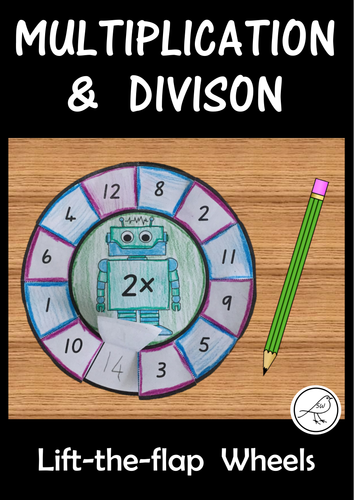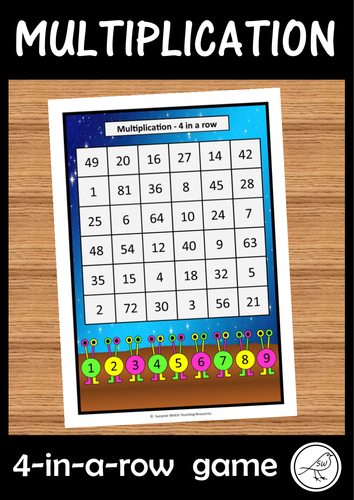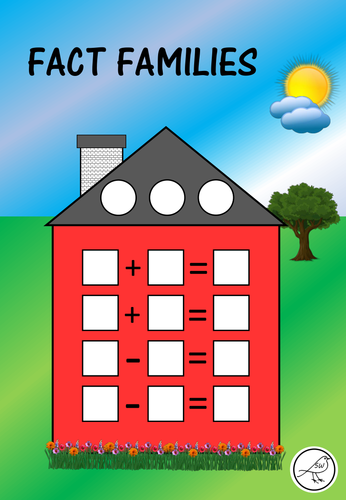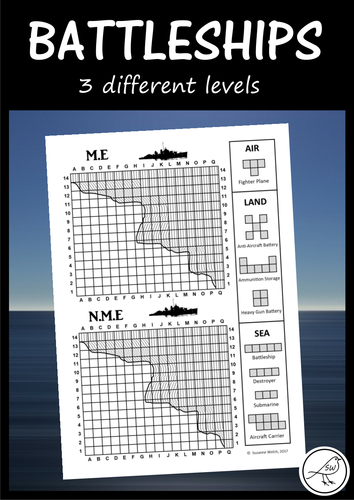
377Uploads
164k+Views
10k+Downloads
Maths for early years

Christmas Art - Angels
A ‘Fun with a Ruler’ art project for your students to complete during the Christmas season. There are 3 different templates to create 3 slightly different angels.
This project involves your students ruling straight lines between 2 dots on a template. When they have finished drawing all of the lines they can give the head some detail (hair, eyes, mouth, etc) and give their artwork some colour.
Included:
♦ 3x templates – black dots
♦ 3x examples – black/white
♦ 3 x instructions
♦ Teacher notes
Level of Difficulty:
Your students need to be able to use a ruler to draw straight lines between 2 points (the curves are made with straight lines … it’s like magic!). The designs can look more complicated than they actually are. Concentration is required, but the actual process is not difficult.
Instructions:
Simple, clear, easy-to-follow instructions are provided. One instruction per page (image and a sentence). Display the instructions via a data projector if you have access to one. Otherwise print and enlarge them and/or demonstrate on an enlarged template.
Equipment:
You need a ruler and a pen (black works best). Something to colour with (eg coloured pencils, watercolours, felt tip markers, chalk pastels, dye, etc)
Keywords: parabolic curves, math, geometry, patterns, string art, Xmas
© Suzanne Welch Teaching Resources

Poppy Art – ANZAC Day, Remembrance Day, Memorial Day, Armistice Day, etc (Design C)
A super-fun art project for your students when celebrating special days such as:
♦ ANZAC Day
♦ Remembrance Day
♦ Memorial Day
♦ Armistice Day
This project involves your students ruling straight lines between 2 dots on a template, to create poppy inspired art work. This is Design C (medal).
Included:
♦ Template
♦ Example – black/white and colour
♦ Instructions
Level of Difficulty:
Your students need to be able to use a ruler to draw straight lines between 2 points (even the curves are made with straight lines … it’s like magic!). The designs look more complicated than they actually are. Concentration is required, but the actual process is not difficult.
Instructions:
Simple, clear, easy-to-follow instructions are provided. One instruction per page (image and a sentence). Display the instructions via a data projector if you have access to one. Otherwise print and enlarge them and/or demonstrate on an enlarged template.
Equipment Needed:
You need a ruler and a pen (black works best). Something to colour with (eg coloured pencils, watercolours, felt tip markers, chalk pastels, dye, etc)
Size:
The artwork measures approximately 17cm x 17cm. Designed on A4 size paper.
This is Design C (medal). Other designs are also available in my store:
Design A - wreath
Design B - cross
Design D - poppy
Keywords: string art, parabolic curves, math, geometry, patterns, war, symbolism, veteran
**********************************************************************
© Suzanne Welch Teaching Resources

Poppy Art – ANZAC Day, Remembrance Day, Memorial Day, Armistice Day, etc (Design B)
A super-fun art project for your students when celebrating special days such as:
♦ ANZAC Day
♦ Remembrance Day
♦ Memorial Day
♦ Armistice Day
This project involves your students ruling straight lines between 2 dots on a template, to create poppy inspired art work. This is Design B (cross).
Included:
♦ Template
♦ Example – black/white and colour
♦ Instructions
Level of Difficulty:
Your students need to be able to use a ruler to draw straight lines between 2 points (even the curves are made with straight lines … it’s like magic!). The designs look more complicated than they actually are. Concentration is required, but the actual process is not difficult.
Instructions:
Simple, clear, easy-to-follow instructions are provided. One instruction per page (image and a sentence). Display the instructions via a data projector if you have access to one. Otherwise print and enlarge them and/or demonstrate on an enlarged template.
Equipment Needed:
You need a ruler and a pen (black works best). Something to colour with (eg coloured pencils, watercolours, felt tip markers, chalk pastels, dye, etc)
Size:
The artwork measures approximately 17cm x 17cm. Designed on A4 size paper.
Other designs are also available (in my store):
* Design A - wreath
* Design C - medal
* Design D - poppy
© Suzanne Welch Teaching Resources

Poppy Art – ANZAC Day, Remembrance Day, Memorial Day, Armistice Day (Design D)
A super-fun art project for your students when celebrating special days such as:
♦ ANZAC Day
♦ Remembrance Day
♦ Memorial Day
♦ Armistice Day
This project involves your students ruling straight lines between 2 dots on a template, to create poppy inspired art work. This is Design D (poppy).
Included:
♦ Template
♦ Example – black/white and colour
♦ Instructions
Level of Difficulty:
Your students need to be able to use a ruler to draw straight lines between 2 points (even the curves are made with straight lines … it’s like magic!). The designs look more complicated than they actually are. Concentration is required, but the actual process is not difficult.
Instructions:
Simple, clear, easy-to-follow instructions are provided. One instruction per page (image and a sentence). Display the instructions via a data projector if you have access to one. Otherwise print and enlarge them and/or demonstrate on an enlarged template.
Equipment Needed:
You need a ruler and a pen (black works best). Something to colour with (eg coloured pencils, watercolours, felt tip markers, chalk pastels, dye, etc)
Size:
The artwork measures approximately 17cm x 17cm. Designed on A4 size paper.
This is Design D (poppy). Other designs are also available in my store:
Design A - wreath
Design B - cross
Design C - medal
Keywords: string art, parabolic curves, math, geometry, patterns, war, symbolism, veteran
**********************************************************************
© Suzanne Welch Teaching Resources

Lucky 4 Leaf Clover – Fun with a Ruler
This art activity can be used for any theme, not just as a ‘lucky four leaf clover’.
The activity involves your students ruling straight lines between 2 dots on a template. When they have finished drawing all of the lines they can give their artwork some colour. The example shows writing in each leaf, but you can change this if you wish.
Included:
♦ Template – black dots
♦ Template – light grey dots
♦ Example
♦ Instructions
♦ Teacher notes
♦ Coloured example
Level of Difficulty:
Your students need to be able to use a ruler to draw straight lines between 2 points (the curves are made with straight lines … it’s like magic!). The designs can look more complicated than they actually are. Concentration is required, but the actual process is not difficult.
Instructions:
Simple, clear, easy-to-follow instructions are provided. One instruction per page (image and a sentence). Display the instructions via a data projector if you have access to one. Otherwise print and enlarge them and/or demonstrate on an enlarged template.
Practise Tempate:
A practise template is included for your students to practise ruling the pattern before you give them the actual template.
Equipment:
You need a ruler and a pen (black works best). Something to colour with (eg coloured pencils, watercolours, felt tip markers, chalk pastels, dye, etc)
Size:
The square is approximately 17cm x 17cm. Designed on A4 size paper.
Keywords: St Patrick's Day, Ireland, Irish, string art, math, geometry, patterns, parabolic curves.
© Suzanne Welch Teaching Resources

Poppy Art – ANZAC Day, Remembrance Day, Memorial Day, Armistice Day, etc (Design A)
A super-fun art project for your students when celebrating special days such as:
♦ ANZAC Day
♦ Remembrance Day
♦ Memorial Day
♦ Armistice Day
This project involves your students ruling straight lines between 2 dots on a template, to create poppy inspired art work. This is Design A (wreath).
Included:
♦ Template
♦ Example – black/white and colour
♦ Instructions
Level of Difficulty:
Your students need to be able to use a ruler to draw straight lines between 2 points (even the curves are made with straight lines … it’s like magic!). The designs look more complicated than they actually are. Concentration is required, but the actual process is not difficult.
Instructions:
Simple, clear, easy-to-follow instructions are provided. One instruction per page (image and a sentence). Display the instructions via a data projector if you have access to one. Otherwise print and enlarge them and/or demonstrate on an enlarged template.
Equipment Needed:
You need a ruler and a pen (black works best). Something to colour with (eg coloured pencils, watercolours, felt tip markers, chalk pastels, dye, etc)
Size:
The artwork measures approximately 17cm x 17cm. Designed on A4 size paper.
These designs are also available (in my store):
* Design B - cross
* Design C - medal
* Design D - poppy
Keywords: string art, parabolic curves, math, geometry, patterns, war, symbolism, veteran
© Suzanne Welch Teaching Resources

St Patrick's Day Art - Shamrock
A ‘Fun with a Ruler’ art project for your students to complete on St Patrick’s Day. There are 2 different templates to choose from.
This project involves your students ruling straight lines between 2 dots on a template. When they have finished drawing all of the lines they can give their artwork some colour.
There is space at the bottom of each template for a writing task that you may wish to set (eg ‘If I found a pot of gold I would …’). If you don’t want this, simply cut the artwork out when finished.
Included:
♦ Shamrock with pot of gold.
♦ Shamrock without pot of gold.
♦ Shamrock – draw your own stem, without pot of gold.
♦ Practise template.
♦ Example of the completed design.
♦ Instructions.
The templates are provided in both black and light grey dots.
Level of Difficulty:
Your students need to be able to use a ruler to draw straight lines between 2 points. The designs can look more complicated than they actually are. Concentration is required, but the actual process is not difficult.
Instructions:
Simple, clear, easy-to-follow instructions are provided. One instruction per page (image and a sentence). Display the instructions via a data projector if you have access to one. Otherwise print and enlarge them and/or demonstrate on an enlarged template.
Practise Tempate:
A practise template is included for your students to practise ruling the pattern before you give them the actual template.
Equipment:
You need a ruler and a pen (black or green works best for this project). Something to colour with (eg coloured pencils, watercolours, felt tip markers, chalk pastels, dye, etc)
Keywords: string art, math, geometry, patterns, Ireland, Irish, luck.
© Suzanne Welch Teaching Resources

Star Art – Templates – Set B
Fun With Lines. Dotty templates to create 4 different stars. Simply draw straight lines connecting the dots on the templates and wonderful designs will appear … such fun!
This is Set B.
Included:
♦ 4 different star templates
♦ Example stars – black lines
♦ Example stars - coloured
♦ Easy-to-follow instructions (with images)
The Process:
♦ Draw the lines.
♦ Add colour.
♦ Cut it out.
♦ Display.
The Instructions:
I have provided step-by-step instructions that show you how to complete the artwork. Each step is on one page with concise, kid-friendly instructions and an image. Print them out or display via a data projector – a great way for your students to self-check and manage their own learning. (Plus, it will save you from having to answer millions of “Is this right?” questions!)
Great for a topic study on Space or for celebrations such as Matariki (Māori New Year).
This is Set B. Set A is also available in my store.
**********************************************************************
© Suzanne Welch Teaching Resources

Math Basic Fact Cards – Set 1 - Addition
60 basic fact cards with addition questions (using numerals 0 to 10)
20 questions per card.
Answers are on the back of the card (great for self-marking)
Each card has the same level of difficulty.
Every second question is in bold font.
All questions/answers are numbered 1-20.
Examples of questions:
4+2
6+7
0+9
8+8
Ideas for using these cards in your classroom:
♦ daily practise.
♦ warm up math activity.
♦ math rotation activity.
♦ independent math centre activity.
♦ early finisher activity.
♦ math challenge activity (eg complete 3 cards in 3 minutes with 100% accuracy)
What you need to do:
Print, cut, fold and laminate the cards. (They need to be folded so the question is on the front and the answer is on the back). If you purchase additional sets (see below) then I suggest you print them onto coloured paper to differentiate them.
Made on A4 size paper.
4 cards per sheet.
Each card is approximately 45mm by 135mm.
The font is Calibri size 14.
10 different sets of basic fact cards are available in my store:
SET 1 – addition
SET 2 – subtraction
SET 3 – addition and subtraction
SET 4 – addition and subtraction with a missing number or sign (eg 4+=9 or 31=4)
SET 5 – multiplication (0x0 to 12x12)
SET 6 – division
SET 7 – multiplication and division
SET 8 – addition, subtraction, multiplication and division
SET 9 – add/sub/mult/div with a missing number or sign (eg. x4=36 or 279=3)
SET 10 – add/sub/mult/div with brackets eg. (3+4) x (12-2)
Please note that these sets of basic fact cards are also part of my 'BASIC FACT BLACK BELT CHALLENGE.
© Suzanne Welch Teaching Resources

Math Basic Fact Cards – Set 3 – Addition and Subtraction
60 basic fact cards with a mixture of addition and subtraction questions.
Addition questions use numerals 0-10 and subtraction questions use numerals 0-20.
20 questions per card (10 addition questions followed by 10 subtraction questions).
Answers are on the back of the card (great for self-marking)
Each card has the same level of difficulty.
Every second question is in bold font.
All questions/answers are numbered 1-20.
Examples of questions:
8+2
7+7
16-10
11-4
Ideas for using these cards in your classroom:
♦ daily practise.
♦ warm up math activity.
♦ math rotation activity.
♦ independent math centre activity.
♦ early finisher activity.
♦ math challenge activity (eg complete 3 cards in 3 minutes with 100% accuracy)
What you need to do:
Print, cut, fold and laminate the cards. (They need to be folded so the question is on the front and the answer is on the back). If you purchase additional sets (see below) then I suggest you print them onto coloured paper to differentiate them.
Made on A4 size paper.
4 cards per sheet.
Each card is approximately 45mm by 135mm.
The font is Calibri size 14.
10 different sets of basic fact cards are available in my store:
SET 1 – addition
SET 2 – subtraction
SET 3 – addition and subtraction
SET 4 – addition and subtraction with a missing number or sign (eg 4+=9 or 31=4)
SET 5 – multiplication (0x0 to 12x12)
SET 6 – division
SET 7 – multiplication and division
SET 8 – addition, subtraction, multiplication and division
SET 9 – add/sub/mult/div with a missing number or sign (eg. x4=36 or 279=3)
SET 10 – add/sub/mult/div with brackets eg. (3+4) x (12-2)
Please note that these sets of basic fact cards are also part of my 'BASIC FACT BLACK BELT CHALLENGE.
© Suzanne Welch Teaching Resources

Math Basic Fact Cards – Set 2 - Subtraction
60 basic fact cards with subtraction questions (using numerals up to 20)
20 questions per card.
Answers are on the back of the card (great for self-marking)
Each card has the same level of difficulty.
Every second question is in bold font.
All questions/answers are numbered 1-20.
Examples of questions:
5-5
17-4
10-6
9-7
Ideas for using these cards in your classroom:
♦ daily practise.
♦ warm up math activity.
♦ math rotation activity.
♦ independent math centre activity.
♦ early finisher activity.
♦ math challenge activity (eg complete 3 cards in 3 minutes with 100% accuracy)
What you need to do:
Print, cut, fold and laminate the cards. (They need to be folded so the question is on the front and the answer is on the back). If you purchase additional sets (see below) then I suggest you print them onto coloured paper to differentiate them.
Made on A4 size paper.
4 cards per sheet.
Each card is approximately 45mm by 135mm.
The font is Calibri size 14.
10 different sets of basic fact cards are available in my store:
SET 1 – addition
SET 2 – subtraction
SET 3 – addition and subtraction
SET 4 – addition and subtraction with a missing number or sign (eg 4+=9 or 31=4)
SET 5 – multiplication (0x0 to 12x12)
SET 6 – division
SET 7 – multiplication and division
SET 8 – addition, subtraction, multiplication and division
SET 9 – add/sub/mult/div with a missing number or sign (eg. x4=36 or 279=3)
SET 10 – add/sub/mult/div with brackets eg. (3+4) x (12-2)
Please note that these sets of basic fact cards are also part of my 'BASIC FACT BLACK BELT CHALLENGE.
© Suzanne Welch Teaching Resources

Number cards 0 to 20 – New Zealand handwriting font
Number cards that can be used for handwriting/maths integration.
Laminate the cards. Your students can then ‘write and wipe’.
The font used is ‘NZ Basic Script’. The letter/number shapes are the same as those recommended in the NZ Ministry of Education Handbook – ‘Teaching Handwriting’.
3 Different Sets of Cards:
♦ 0-20 with empty tens frames (for students to record the number)
♦ 0-20 with counters in tens frames (for students to colour)
♦ 0-20 with empty box (you choose what to draw/write here)
Examples of what your students might draw/write in the empty box:
• Write the number (eg write 7 seven times)
• Write the word (eg ‘seven’)
• Draw a picture (eg draw 7 apples on a tree)
• Write a math fact using the number (eg 5+2=7)
2 cards on each A4 sheet of paper.
© Suzanne Welch Teaching Resources

Math Basic Fact Cards – Set 4 – Addition and Subtraction with box
60 basic fact cards with addition and subtraction questions.
The answer may be a number or a math sign (+ or -)
The addition and subtraction questions use numerals 0-20.
20 questions per card.
Answers are on the back of the card (great for self-marking)
Each card has the same level of difficulty.
Every second question is in bold font.
All questions/answers are numbered 1-20.
Examples of questions:
14+□=20
□+3=7
8□2=6
17-10=□
Ideas for using these cards in your classroom:
♦ daily practise.
♦ warm up math activity.
♦ math rotation activity.
♦ independent math centre activity.
♦ early finisher activity.
♦ math challenge activity (eg complete 3 cards in 3 minutes with 100% accuracy)
What you need to do:
Print, cut, fold and laminate the cards. (They need to be folded so the question is on the front and the answer is on the back). If you purchase additional sets (see below) then I suggest you print them onto coloured paper to differentiate them.
Made on A4 size paper.
4 cards per sheet.
Each card is approximately 45mm by 135mm.
The font is Calibri size 14.
10 different sets of basic fact cards are available in my store:
SET 1 – addition
SET 2 – subtraction
SET 3 – addition and subtraction
SET 4 – addition and subtraction with a missing number or sign (eg 4+=9 or 31=4)
SET 5 – multiplication (0x0 to 12x12)
SET 6 – division
SET 7 – multiplication and division
SET 8 – addition, subtraction, multiplication and division
SET 9 – add/sub/mult/div with a missing number or sign (eg. x4=36 or 279=3)
SET 10 – add/sub/mult/div with brackets eg. (3+4) x (12-2)
Please note that these sets of basic fact cards are also part of my 'BASIC FACT BLACK BELT CHALLENGE.
© Suzanne Welch Teaching Resources

Math Basic Facts – BLACK BELT CHALLENGE
A basic fact challenge – can your students pass all 10 levels to achieve their ‘Black Belt’ in basic facts?
Students are given a time frame to finish a certain amount of questions with 100% accuracy in order to pass a level (time frame and quantity of questions to be decided by each teacher).
Each card has the answers on the back so students mark their own work … no extra work for you!
Level 1 – White Belt – addition (numerals 0-10)
Level 2 – Yellow Belt – subtraction (numerals 0-20)
Level 3 - Orange Belt – addition and subtraction
Level 4 – Green Belt – addition and subtraction with a missing number or sign
Level 5 – Blue Belt – multiplication (0x0 to 12x12)
Level 6 – Purple Belt – division
Level 7 – Pink Belt – multiplication and division
Level 8 – Red Belt – addition, subtraction, multiplication and division
Level 9 – Brown Belt - addition, subtraction, multiplication and division with a missing number or sign
Level 10 – Black Belt – addition, subtraction, multiplication and division with brackets
Included:
♦ 60 different cards for each level (total of 600 cards – just print what you need).
♦ Student recording sheet (use this or just write the answers in a math exercise book).
♦ Certificates – provided in both colour and black/white.
♦ Student celebration sheet (colour the belt as you achieve).
♦ Class tracking sheet.
♦ Teacher notes.
♦ Blank templates to adjust the order of the levels (if desired) – student celebration sheet and class tracking sheet.
♦ Supplementary sheets for US classrooms (the word ‘colour’ changed to ‘color’).
What you need to do:
Print, cut, fold and laminate the cards. (They need to be folded so the question is on the front and the answer is on the back). Admittedly this takes a bit of setting up, but sit yourself in front of the TV with the laminator and time will go quickly! You will find this resource extremely useful because it caters to such a wide range of ability levels and the cards can be used in many different ways (not just for this black belt challenge).
♦ 10 levels.
♦ 60 cards per level.
♦ 20 questions per card.
♦ Answers are on the back of the card (great for self-marking).
♦ Questions and answers are all numbered 1-20.
♦ All of the cards in each level have the same degree of difficulty.
♦ Size 14 Calibri font is used. Alternate questions are in bold font.
♦ Each card is approximately 45mm by 135mm in size (once folded).
♦ 4 cards per A4 sheet of paper.
Please note that the cards used in this resource can also be purchased in separate sets which are not part of the ‘Black Belt Challenge’. The cards are identical but they are all black/white. They are available in my store ... Math Basic Fact Cards Set 1-10
© Suzanne Welch Teaching Resources

Multiplication and Division Wheels - lift the flap
Multiplication and Division wheels for the x1 to x12 facts.
A great ‘craftivity’ to help your students learn and practise the instant recall of their multiplication and division facts.
How to make:
♦ colour / decorate
♦ cut out the two wheels and along the dotted lines between the numbers
♦ glue the top and bottom wheels together (in the centre only)
♦ fold back the flaps
♦ write the answers under the flaps
♦ ready to use!
Two formats:
♦ with a robot graphic.
♦ plain so your students can decorate and personalise their own wheel.
Included:
♦ 12 multiplication wheels with a robot graphic.
♦ 12 multiplication wheels without a graphic.
♦ 12 division wheels with a robot graphic.
♦ 12 division wheels without a graphic.
♦ Instruction sheet.
Designed on A4 size paper.
The font used is ‘NZ Basic Script’. The number shapes are the same as those recommended in the NZ Ministry of Education Handbook – ‘Teaching Handwriting’.
**********************************************************************
© Suzanne Welch Teaching Resources

Multiplication Game - 4 in a row (alien theme)
A fun multiplication game that reinforces knowledge of the 1x1 to 9x9 facts.
Included:
♦ 4 game boards (numbers are arranged differently on each board)
♦ Instructions
♦ Multiplication grid (to support lower ability students)
Provided in colour and black/white.
How to Play:
Player A starts by placing a marker under (or on) two of the alien numbers at the bottom of the game board. Player A multiplies these two numbers together and covers that answer on the board with one of their counters. Player B moves one of the markers to a new number. Player B multiplies these two numbers together and covers that answer on the board with one of their counters. Play continues in this way, with players taking alternate turns and moving only one of the markers each time. If a player moves a marker to make a multiplication question where the answer is already covered, they lose their turn. The winner is the player who makes a row of 4 with their counters. The row may be horizontal, diagonal or vertical.
Number of players: 2
Equipment: counters and markers (The markers are used to show which two 'alien' numbers are being multiplied together. You could use counters, paper clips, little sticks, etc.)
**********************************************************************
© Suzanne Welch Teaching Resources

Family of Facts / Fact Families - houses
Resources for teaching family of facts in math lessons.
Included:
♦ Addition/Subtraction – house and worksheet
♦ Multiplication/Division – house and worksheet
♦ Ice-cream craft and worksheet
The Houses:
The houses are provided in colour, grey, and black/white. Laminate the house and then use it as a teaching tool during lessons (write and wipe). Write 3 family numbers in the circles in the roof.
The Worksheets:
Two worksheets are provided. One with four houses and the other with 6 houses. Write 3 family numbers in the circles prior to photocopying.
The Ice-cream:
Create a 4-scoop ice-cream showing a family of facts.
**********************************************************************
© Suzanne Welch Teaching Resources

Number of the Day - Cards (circle border)
Number of the Day – Cards
Strengthen your student’s number knowledge with these task cards. 57 different questions that are applied to your number of the day. Simply pick and choose the cards that are appropriate for your learners.
Included:
♦ 57 cards (3 per page)
♦ Template to make additional cards
♦ Teacher notes
♦ Example answers (using number of the day: 538)
♦ Number of the day worksheet
Suggested Use:
♦ a warm up activity for a maths lesson.
♦ a math centre activity.
♦ an early finisher activity.
♦ an activity while waiting for ‘teacher time’.
♦ a lesson with a focus on number knowledge.
This resource is also available in an alternative border (scrappy style), in my store.
© Suzanne Welch Teaching Resources

Battleships Game - 3 different levels
Battleships Game
3 different levels. 4 different templates within each level.
Great for reinforcing a math lesson on CO-ORDINATES.
Level 1:
11x10 grid.
5 different forces (7 to destroy).
4 different templates.
Level 2:
17x14 grid.
8 different forces.
4 different templates.
Level 3:
24x14 grid.
Determine your own forces.
4 different templates.
Chart provided to show air/land/sea forces.
Instructions included.
Co-ordinates are letter/number (eg B12)
Land, Air and Sea forces.
© Suzanne Welch Teaching Resources

Playdough Number Mats (1-10)
Playdough Number Mats - Numbers 1-10
♦ Your students make a playdough number and place it on the number on the card.
♦ Then they make some objects for the picture (a small picture in the bottom left corner of each card indicates what they need to make and place on the big picture).
Make 1 spider for the web.
Make 2 fish for the fish bowl.
Make 3 cupcakes for the plate.
Make 4 butterflies for the garden
Make 5 buttons for the shirt.
Make 6 sausages for the fry pan.
Make 7 apples for the tree.
Make 8 eggs for the nest.
Make 9 worms for the pile of dirt.
Make 10 candles for the birthday cake.
The font used is ‘NZ Basic Script’. The number shapes are the same as those recommended in the NZ Ministry of Education Handbook – ‘Teaching Handwriting’.
A4 size.
© Suzanne Welch Teaching Resources

